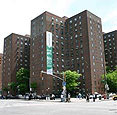
Stuyvesant Town and Peter Cooper Village
A State Supreme Court judge ruled that MetLife could remain liable for over $200 million in rent overcharges at Stuyvesant Town and Peter Cooper Village, which the insurance firm owned prior to the 2006 sale to Tishman Speyer.
The decision means that thousands of current and former Stuyvesant Town and Peter Cooper Village tenants will be able to pursue MetLife for retroactive rent that was charged prior to the $5.4 billion sale of the complex.
“We are studying the opinion in order to determine our next steps,” said MetLife spokesperson John Calagna.
“The court in a very strong decision concluded that the case would apply retroactively,” said City Council member Dan Garodnick, a resident of Stuyvesant Town, and long-time tenant advocate. “That is a significant development for tenants.”
Tenants previously sued Tishman Speyer and MetLife for illegally deregulating apartments, even though the landlords were receiving so-called J-51 tax benefits that would help cover renovation costs in return for keeping apartments affordable. Tishman Speyer later defaulted on the billions of dollars in debt at the 11,000- unit complex, and is facing foreclosure proceedings.
Lawyers for the tenants said they were happy with the ruling.
“The tenants are very pleased and gratified with the decision,” said Alex Schmidt, who represented tenants in the case. “They had been paying excessive rents for many years, most of which they will not be able to recover based on the four-year statute of limitations.”
In October, the New York state Court of Appeals ruled that the owners of Stuyvesant Town and Peter Cooper Village should not have deregulated the rent-stabilized apartments in the 11,000-unit complex, because the firm had been receiving tax breaks for renovations at the time. Tenants accused the owners, and former owner MetLife, of illegally increasing rents on one quarter of the units to market rates.
MetLife later filed to dismiss the tenants’ case, claiming that the decision should not apply since it sold the property three years before. MetLife was granted the J-51 tax benefits in 1992.